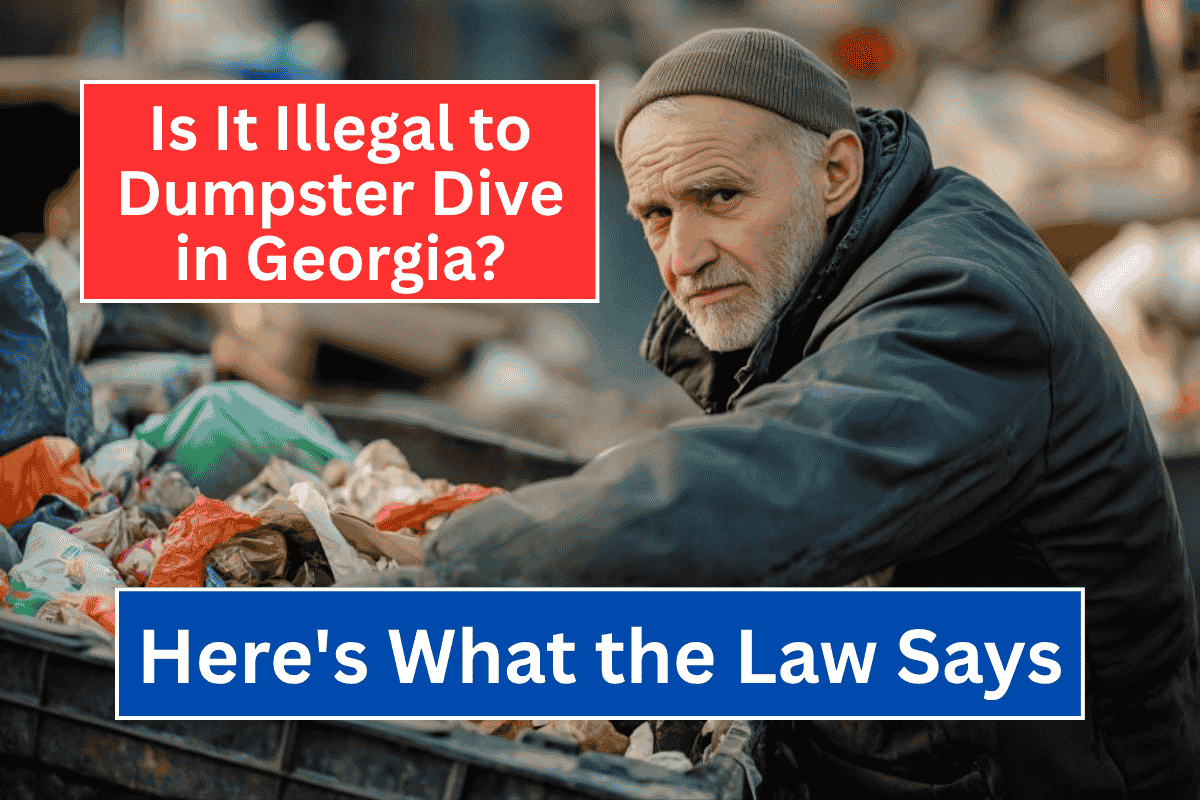Dumpster diving, the act of searching through commercial or residential trash for discarded items, is generally legal in Georgia but comes with some important restrictions.
Whether you’re interested in finding reusable goods or simply curious about the practice, it’s crucial to understand the legal landscape surrounding dumpster diving in Georgia to avoid potential legal trouble.
Statewide Law on Dumpster Diving in Georgia
No Statewide Ban: Georgia does not have a state law that explicitly prohibits dumpster diving. It is generally legal as long as certain conditions are met.
Supreme Court Precedent: The U.S. Supreme Court’s 1988 decision in California v. Greenwood ruled that trash left for collection is not protected by privacy rights. This means that, unless other laws are violated, dumpster diving is allowed, as trash left on the curb is considered abandoned property.
Key Restrictions and Local Ordinances
While dumpster diving may be legal statewide, there are some restrictions that can vary by location. It’s important to be aware of specific local ordinances and rules to avoid running afoul of the law.
1. Trespassing
Most dumpsters are located on private property—behind stores, inside fenced areas, or in other places where access is restricted. Entering private property to access a dumpster without permission is considered trespassing and can result in legal action. Trespassing laws can lead to fines, legal penalties, or even arrest.
2. Local Ordinances
Different cities and towns in Georgia may have their own laws regarding dumpster diving. Some areas have explicitly banned the practice or imposed fines for violating local regulations. For example:
City of Hiram: The city has an explicit ordinance that prohibits dumpster diving altogether.
City of Douglas: This city also bans dumpster diving in another person’s trash container or dumpster, and violators can be fined.
3. Public Property
Dumpster diving is generally legal in public spaces, such as parks or sidewalks, as long as there are no posted restrictions. It’s important to check for any signage indicating that the dumpster is not for scavenging. You must also ensure that you are not trespassing on adjacent private property.
Penalties for Violating Dumpster Diving Rules
Dumpster diving can lead to legal consequences if local rules are violated or if you trespass on private property. Some of the penalties include:
Trespassing Charges: Accessing a dumpster on private property without permission can result in trespassing charges, fines, and possible arrest. This can occur if the dumpster is behind fences or gates, or if there are “No Trespassing” or “No Scavenging” signs.
City Fines: Some municipalities, such as Hiram and Douglas, may issue fines or citations for violating local anti-scavenging ordinances.
Best Practices for Legal Dumpster Diving
To ensure that you’re dumpster diving legally in Georgia, follow these guidelines:
Stick to Public Areas: Only dive in dumpsters located in public areas like sidewalks or public parks where there are no posted restrictions.
Check for Signs: Always check for signs that may prohibit trespassing or scavenging, such as “No Trespassing” or “No Scavenging” signs. Avoid dumpsters with these markings.
Respect Local Laws: Understand and respect city or county ordinances, as local laws can vary. Always check the rules of the area you’re in before diving.
Avoid Locked Dumpsters: Never attempt to break locks or barriers to access a dumpster. Doing so is not only illegal but can lead to theft charges.
Be Respectful: Clean up after yourself to avoid creating a mess. Littering can result in additional fines or penalties.
Summary Table: Legal Status of Dumpster Diving in Georgia
| Area | Legality of Dumpster Diving |
|---|---|
| Statewide | Legal, unless trespassing or local bans exist |
| Private Property | Illegal without permission |
| Public Property | Legal if no posted restrictions |
| Some Cities | May have specific bans or fines (e.g., Hiram, Douglas) |












